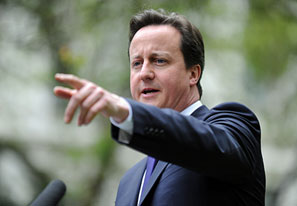
On Election Day, May 7, I went to see my doctor, a Polish immigrant. Because he was a legal resident he had the right to vote, and he lost no time (in a very un-English way) in telling me that he was voting Tory. I turned to his nursing assistant, who was also in the room.
“You’d better vote Tory too,” I said, “or you’ll be out of a job.”
“I’m voting Conservative,” she said.
“The Tories are the Conservatives,” said the doctor.
“I never knew that,” she said. “I always wondered who they were.”
I was immediately reminded of what Churchill once said: the best argument against democracy is a five-minute conversation with the average voter. How, I wondered, could someone born and bred in this country reach her early twenties and not know that the Tories were the Conservatives? How had she managed not to notice it? But then she said something that redeemed her a little: “I want to keep what we have, you never know with change, do you?”
In any case, she was not alone in her ignorance. It turned out that the pollsters, with nothing else to do but prognosticate, were completely wrong. They had predicted that Labour and the Conservatives would be neck and neck, but the Conservatives polled 6 percent more votes than Labour and won an unexpectedly outright majority in the House of Commons.
Why were the polls so wrong? One possible explanation is that people are reluctant to admit to third parties that they are going to vote Conservative, as if to do so were to admit a secret vice or to being actuated only by the most selfish motives. In other words, their reluctance is an indication of how far the Left has won the battle for the hearts and minds of at least a large section of the population, who do not believe that there can be any respectable arguments for conservatism. Not, of course, that the British Conservatives are genuinely conservative; they are merely less progressive than their opponents. The very term progressive causes a bias against conservatives, for who can be against progress? That real progress occurs largely by non-political means is not an idea that can be expressed in a slogan, while supposed progress by political means can easily be reduced to slogans. Moreover, since competitive politics is about the righting of wrongs and the addressing of complaint, any suggestion that some things should remain the same is easily portrayed as unfeeling complacency by the privileged.
In fact, the reelection of David Cameron, which in the past would have been a manifestation of stability, solves nothing of the crisis of political legitimacy in Britain (constitutional legitimacy is something else). With voter turnout of 66 percent and the British party system Balkanized, Cameron won reelection with the suffrage of 24.7 percent of the adult population. Even more startling was the fact that a vote for the Scottish Nationalists weighed nearly 150 times more heavily as far as representation in Parliament was concerned as did a vote for UKIP. (It took 25,974 votes to elect an SNP Member of Parliament, but 3,881,129 to elect a UKIP one.) A vote for the SNP weighed about 25 times more than a vote for the Greens. The SNP won 50 percent of the votes in Scotland but 95 percent of the seats. Clearly, we now live in an unrepresentative democracy.
For the SNP, it was a heads-I-win-tails-you-lose election. If Labour had won more seats than the Conservatives, but not an absolute majority (which was always very unlikely), the SNP would have been able to dictate policy or at least influence it strongly; if the Conservatives won, the SNP could claim that the U.K. government had no mandate or legitimacy in Scotland, and use the vote to emphasize the difference between England and Scotland, and perhaps as a further grievance.
Cameron’s problems are just beginning, and his triumph will be short-lived. He has promised a referendum on membership of the European Union, a promise that would be difficult even for Houdini to escape; and if it goes against membership, the Scots, who are Europhile but anti-English, might declare their independence and try to remain in the European Union (though it is by no means a foregone conclusion that the Union would have them). Nor would independence be without potential for creating deep divisions, bitterness, and conflict within Scotland itself, though the leadership of the SNP speaks the language of unanimity. The potential for chaos both north and south of the border is enormous.
One of Britain’s prevailing assets has been its political stability. But that stability has evaporated, probably for good—with potentially disastrous results for its financial sector, upon which it so strongly (though foolishly) depends. Terrible political problems have been conjured out of nothing except the ambition of politicians, and the country’s deeper problems—its low productivity, its abysmal cultural and educational levels—remain not only unanswered, but unremarked.